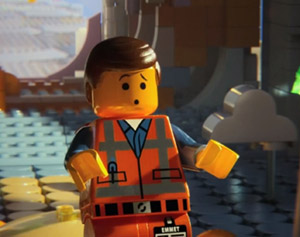
The Lego Movie
The pizza was delicious, but the company was even more satisfying.
It was May 5 and Miami Shores was its usual sleepy self on a Monday night. Down at Pizzafiore on Northeast Second Avenue, though, three fellow movie geeks and me were dining and dishing before attending this year's Miami Gay and Lesbian Film Festival (MGLFF) screening of Xavier Dolan's curmudgeonly Tom at the Farm, a potent detour from the typically crowd-pleasing – and often toothless – fare one associates with festival titles relegated to the suburban confines of the Shores Theater. Earlier that day at a press screening, I'd seen Locke, a gripping British import featuring a sensational Tom Hardy driving in his SUV while his character's personal and professional life proceeds to implode over the course of 90 minutes, and I was primed for another winning movie outing.
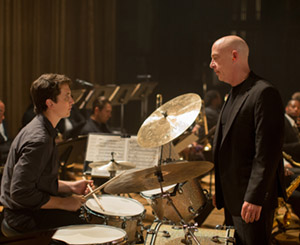
Photographer: Daniel McFadden
Whiplash
It was at this point that one of my peers, a fellow film correspondent sitting across from me at the table, shared his accreditation woes, how it took Herculean efforts for him to get MGLFF staffers to respond to his e-mails, one year after he, an openly gay journalist and critic, had been turned down for press credentials by the same festival for no good reason other than his media outlet at the time did not “fit the intended criteria.”
Then he took out his MGLFF media badge, put it on on top of the table, and turned it around. The caption on the back read, “Press may take any open seat following rush line sales. Should a late-arriving patron require a seat, press should be prepared to give up his or her seat.” The statement contradicted an e-mail reporters received assuring them they would be let into screening venues after festival members but ahead of general admission and rush line ticket holders.
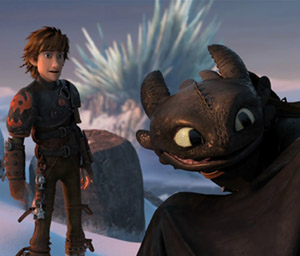
How To Train Your Dragon 2
My two other friends, an arthouse owner and a programmer for a different film festival, were understandably aghast, and I struggled to comprehend why a festival with such a troubled history – full disclosure: I worked with the organization from 1999 to 2005 – would treat local and out-of-town media so poorly; indeed, that it would take specific steps to place them at the bottom of the screening totem pole so dismissively. Compared to what my colleague had been going through, foibles I'd experienced like, say, being denied entry to an afternoon industry reception during the Miami International Film Festival by an apologetic bouncer – “I was told no press,” he said – seemed downright benign.
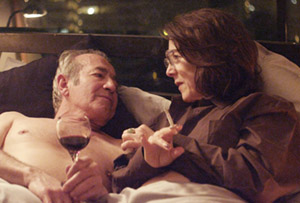
Gloria
Dinner suddenly started seeming less appetizing by the second, bummed out as I was by fest organizers' lack of consideration. Prim entitlement, if you will.
This anecdote, alas, is all too indicative of the way things went down in 2014 at the movies in general and South Florida's film community in particular: moments of intimate bliss dampened by encroaching discord. To be fair, the year wasn't without its bright spots, but too many were forced to duke it out with more popular, astonishingly overpraised cinematic “accomplishments” for their turn at the spotlight. Unsavory characters and reductive trends took over the conversation, both on screen and off.
For every labor of love that lived up to the hype – hello, Boyhood and Selma – a dozen more titles struggled to find an appreciative audience, in many cases failing to receive the TLC they merited from distributors intent on prioritizing releases deemed to have sturdier awards-season legs.
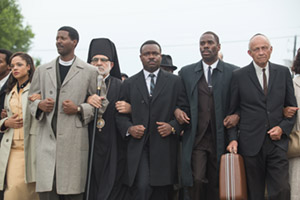
Photographer: Photo credit: Atsushi Nishijima
Selma
Still, let's give credit where credit is due. Kudos to the folks at Fox Searchlight for riding that Grand Budapest Hotel wave all the way from February to year-end accolades from critics, industry types and audiences alike. Me? I dug the latest oddity from the idiosyncratic Wes Anderson, in which the Royal Tenenbaums auteur brings to life a decades-bouncing Eastern European tale with flair … and changing aspect ratios. It also showcases his mean-spirited streak, and my goodwill began to wane as the bodies started piling up. (In a change of pace from his tendency to kill off dogs in his movies, an ill-fated kitty meets its maker in cartoonish fashion.) Please put the kibosh on the (skillfully executed) bloodletting next time, mister. Otherwise, job well done.
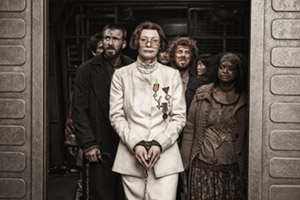
Snowpiercer
Did I say cartoon? 2014 was a good, not exceptional, year for animation, with one outstanding entry towering above a handful of worthy candidates. Congrats are in order for Warner Bros., which kicked off a wildly uneven year with The LEGO Movie, which, like Budapest, deservedly became a runaway hit all the way back in February, and is now the animated feature to beat come Oscar time. Not my favorite contender, but directors Phil Lord and Chris Miller's cheeky brand of pop-culture comfort food is undeniably difficult to resist.
April brought the stateside release of Indonesia's The Raid 2, Gareth Evans' hotly anticipated sequel to his taut, SWAT-team shoot 'em up/martial arts extravaganza from 2012. Being a fan of the original (i.e. The Raid: Redemption), I was looking forward to what the Welsh-born filmmaker would do with a broader canvas. As it happens, the first Raid's shorter running time and single setting – a building tenement run by a mobster and his henchmen – had prompted Evans to exercise discipline sorely lacking in his bloated follow-up. Sure, the strikingly orchestrated rumbles, mano-a-manos and car chases are spectacular ... but what about the wan underworld power struggle tying it all together? The connective tissue matters, people, and with a running time of two and a half hours, this overstuffed piece of fanboy catnip only works when it's on the move, which isn't nearly often enough.
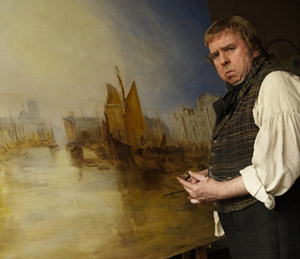
Mr. Turner
Spring gave way to summer, and once again, with few exceptions, studios kept dropping the ball left and right, none more disappointingly than Warner Bros., which unleashed a Godzilla reboot that looked smashing on paper but on screen was plagued by wooden, wafer-thin characters and an endless setup by director Gareth Edwards – not to be confused with Raider Gareth Evans – that takes an eternity to get to the “good stuff,” by which time I'd checked out of this dull monster mash.
Summer also brought Marvel's Guardians of the Galaxy, which captured the hearts of moviegoers across the globe, but left this former comic book collector curiously underwhelmed. Its supporters claimed the insouciant irreverence director/co-screenwriter James Gunn (the far superior Slither) brought to the table offset and at times subverted the film's more familiar boilerplate elements, which are based on an obscure superhero team that began appearing in Marvel Comics in 1969. To which I say bullpucky. Take away the devil-may-care attitude from newly buff Chris Pratt's cocky Peter Quill and Rocket, a prickly CGI furball voiced by Bradley Cooper, and what's left is a listless origin story hampered by the characters' irritating swagger and a villain so generic and forgettable that the movie's plot seemed to vanish from view the second the end credits began rolling … even as “Hooked on a Feeling,” which was featured prominently in the film's soundtrack, stayed stuck in repeat mode in my head for weeks.
Fall is the real summer season for us movie critics, but this year it was more like a long-distance marathon. Studios waited until 2014 was nearly over to bombard critics' circle members with a (noticeably smaller than usual) slew of DVDs, online links and last-minute screenings. It became all too easy for real gems to fall between the cracks amid the higher-profile awards bait, some of which lived up to or exceeded expectations, but which more often than not elicited more shrugs than hurrahs.
To be fair, unlike last year, studios actually showed up this year, as you will see by the inclusion of some very big movies in my Top 10 list. It was also a year of milestones for local arthouses, despite Robert Rosenberg's abrupt, shrouded-in-mystery exit as director of the Coral Gables Art Cinema in September.
After being closed for renovations, the Tower Theater in Little Havana reopened in the spring with brand-spanking-new digital projection, as well as a commitment to show stimulating world cinema and to continue catering to Miami's Spanish-speaking cinephiles. For instance, they're currently showing Alejandro González Iñárritu's Birdman with Spanish subtitles. (I really don't think subtitles in any language are going to redeem what was for me the most miserable moviegoing experience of the year. And I sat through Transformers: Age of Extinction in its entirety. But I digress.)
The folks at O Cinema, on the other hand, appear to be taking a different approach moving forward. A Knight Foundation grant allowed the nonprofit entity to take over the Byron Carlyle Theater in Miami Beach, but instead of programming the varied grab bag of indie films and documentaries that made their Wynwood location transcend its hipster-magnet trappings, they seem intent on scheduling middlebrow fare at the new location, like the pedestrian Stephen-Hawking-in-love drama The Theory of Everything and Jean-Marc Vallée's Reese Witherspoon-against-the-elements yarn Wild. I am sensing they want to rope in a wider audience that might not respond well to more traditional arthouse fare, but they do so at the risk of alienating the patrons who go to O because they show content they can't find at their local multiplex. Hopefully this is just a transitional phase and they will balance out these mainstream titles with edgier options down the line. Pretty please?
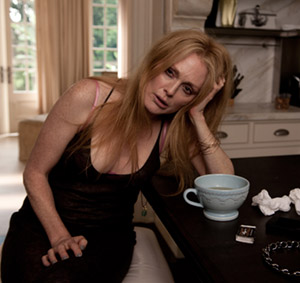
Photographer: Caitlin Cronenberg
Maps to the Stars
Perhaps most invigorating of all, the Miami Beach Cinematheque began hosting “Speaking in Cinema,” an intimate series of panels featuring a local critic, an out-of-town critic and a person involved with the motion picture or exhibit being discussed. The recurring event provides ample proof that it's not always necessary to align oneself with a certain target audience's sensibility to find a new audience. I'm actually pretty sure many movie buffs in South Florida want to experience demanding, outside-the-box content, and those programmers bold enough to stick to their guns should be championed and supported. (This means you, casual multiplex moviegoer/Netflix renter. Mix it up a little. Know what I mean?)
Now that we've covered some of my cine-gripes, let's talk about some of the movies I loved in 2014, an eclectic mix of personal big studio fare and solid imports from Europe and Latin America with an emphasis on auteur-driven efforts. (You may notice no mention of Birdman below. It belongs on a different kind of year-end list.)
10. The Dog: Amy Berg and Frank Keraudren's affectionate nonfiction portrait of John Wojtowicz, the real-life inspiration for the bank robber Al Pacino played in Dog Day Afternoon, is a love story, a civil rights chronicle, a cautionary showbiz profile and a revealing look at prison life all rolled into one compulsively watchable package. A blast.
9. Mr. Turner: Writer-director Mike Leigh (Secrets & Lies, Happy-Go-Lucky) switches to period piece mode for this meticulously crafted portrait of 19th Century landscape painter J. M. W. Turner (1775-1851). The result is one of the most vivid renditions of early-to-mid 1800s I've ever seen on film, anchored by a finely etched turn by Leigh regular Timothy Spall as the titular artist.
8. Gloria: Released way back in January, this Chilean character study depicts the romantic reawakening of Gloria Cumplido (a sensational Paulina García), a vivacious divorcée in her 50s, after she embarks on a relationship with Rodolfo (Sergio Hernández), an older gent who brings his own baggage to the table. Director/co-screenwriter Sebastián Lelio's empathy knows no bounds, and he doesn't shy away from giving viewers a peek at the couple in the bedroom, either.
7. Selma: Much has been made of the contemporary parallels between this stirring civil rights drama and the social unrest that transpired in the country this year. It's not just a thematic overlap. Director Ava DuVernay doesn't treat the material – which focuses on the strife faced by Martin Luther King Jr. (a stellar David Oyelowo) and the activists who joined him in staging the iconic marches instrumental to the passage of the Voting Rights Act of 1965 – as an arid history lesson, even though the dialogue in Paul Webb's screenplay occasionally sounds like the brightest pupil in social studies class showing off. The film resonates because it all feels so immediate and raw, from the violent confrontations between marchers and police to the quieter moments that show the great leader hesitating and doubting his judgment. In other words, displaying recognizable human behavior.
6. Boyhood: Richard Linklater went out and shot this epic of the quotidian over 12 years in his native Texas, checking in on Mason (Ellar Coltrane), his divorced parents (Patricia Arquette and Ethan Hawke, both superb) and his older sister (Lorelei Linklater, the director's daughter) at various intervals, capturing not just the high points a more conventional domestic drama would cover, but the in-between moments as well, amassing a cumulative power from these snippets of mundane details as you experience Mason's growing pains and see your own reflected back at you.
5. Stranger by the Lake: Sure, the legalization of same-sex marriage across the country grabbed headlines, and people are increasingly more comfortable discussing LGBT issues, but why do frank depictions of gay men's sex lives remain underrepresented at the movies, at least outside of queer and queer-friendly film festivals? On the surface, this atmospheric spellbinder brims over with genre pleasures – think Hitchcock in Strangers on a Train mode with a healthy dollop of Patricia Highsmith. Ah, but in writer-director Alain Guiraudie's explicit tale of romantic yearning, carnal desires and murder most foul, all set in a secluded cruising spot in France, still waters run deep, and despite the frisky sexytime shenanigans (including a boner-fide money shot), it's more keen on undressing these men's psyches.
4. Interstellar:Christopher Nolan's thematically weighty foray into science fiction became the year's most polarizing, love-it-or-hate-it fall release, eliciting heated debate among critics and audiences alike. The film's detractors blasted it for its unwieldy use of philosophical jargon and a final act that veered too close to the metaphysical for their taste. It's not as if I disagree with these observations, exactly. But they also don't take into consideration this sci-fi melodrama's Spielbergian sense of wonder, its heady exploration of the space-time continuum, and the awe it engenders as it grapples with the prospect of finding a solution to mankind's impending demise. Nolan's known for cerebral narratives executed with clockwork precision. Here he's found his nurturing side, and that's a breakthrough, as far as I'm concerned.
3. Snowpiercer: One of the best dystopian thrillers in many a moon, South Korean maverick Bong Joon-ho's feature-length class-warfare allegory is set in a mammoth train that circumnavigates the globe after an experiment involving the Earth's atmosphere turns the planet into a giant icicle and eradicates all life. It's an outlandish Gilliam-esque premise, one that's pulled off with kinetic verve and a bracing unpredictability as to who lives or dies. A stellar Chris Evans headlines an international cast that includes Octavia Spencer, Jamie Bell, John Hurt and a delectable Tilda Swinton as a smarmy Thatcherite who maintains the locomotive's rigid class hierarchy. A treat from start to finish.
2. How to Train Your Dragon 2: I can't remember the last time I enjoyed a summer tentpole this much. Picking up five years after its predecessor ended, this rousing Viking fantasy from the gifted Dean DeBlois – going solo after sharing directing duties with his Lilo & Stitch collaborator Chris Sanders the first time around – is the rare sequel that's richer, more nuanced than the original, although this is more of a second chapter in a trilogy than a more run-of-the-mill follow-up (think The Empire Strikes Back and The Two Towers). In Part 1, Hiccup (Jay Baruchel) came of age by befriending the dragon he originally intended to kill; in this installment, he deals with an identity crisis that pits his wandering spirit against a sense of duty to follow in his chieftain father's footsteps. Swashbuckling derring-do and some impressive battle sequences show off some eye-popping 3D animation, but it's during its more intimate scenes that this breathtaking adventure shines. Yes, it's that good.
1. Whiplash: If 2014 was the Year of the Jerk at the movies, then Fletcher, the abusive jazz professor at the center of Damien Chazelle's galvanizing tour-de-force, takes top honors. As played by a ferocious J.K. Simmons, he's the most demanding professor you've ever encountered reborn as an indestructible entity. The sadomasochistic bond that develops between Fletcher and Andrew (Miles Teller), the obsessive drummer that catches his attention, bristles with pent-up tension and is infinitely more fascinating because teacher and pupil are in pursuit of the same thing: achieving perfection. Chazelle steadily tightens his grip on the audience, culminating in a sublime payoff that sends you out of the theater wired and elated. Aided by two incredible performances and first-rate production values – that razor-sharp editing! – no other film I saw in the past 12 months felt so thrillingly alive.
Orphan of the year: David Cronenberg's Maps to the Stars, a scathing Hollywood satire that skewers the movie industry with gusto, would have been #8 on this list, but since this Cannes winner is not scheduled to hit local theaters until sometime in the spring, this is an unfortunate case of a film that's ostensibly a 2014 release – it was released in Canada at the end of October – but as of press time has no concrete release date in South Florida. How very frustrating. For my money, it's not only the Canadian filmmaker's best film since 2005's A History of Violence, but also his funniest. No, really; you can almost hear him giggling behind the camera.
Here's hoping So-Flo's movie people get their act together next year. You may be wondering what happened after we got up from the pizzeria and headed over to the MGLFF screening on that Monday night in May. The Blu-ray screening copy of Tom at the Farm looked muddy and greenish, but the actual film did not disappoint … although, to quote my hapless, badge-wielding friend, “The way the movie looked, if Xavier Dolan had been there, he would have probably killed someone.” (Actually, he probably would just thrown a hissy fit for the ages.) Unfortunately for my colleague, this was not the end of his festival troubles. Later that week he was stopped at the entrance of the Colony Theater on Lincoln Road when trying to attend MGLFF's Closing Night screening of Eytan Fox's Cupcakes because the people supervising admittance were under the impression journalists needed a ticket in addition to their badge. (They did not.)
Is there a happy ending in sight for 2015? MGLFF's programming director got back to me and assured me the box office faux pas concerning press will not happen again. The Miami Jewish Film Festival, a runaway hit at the beginning of the year, has an ambitious lineup in place for this January. Could it possibly be that on Dec. 31, 2015 you'll be reading a much more optimistic survey than the litany of complaints you've just endured? Come on, movie gods, make 2015 the Year of the Nice Guy … and quit it with the jerkitude, already. It's so 2014.




